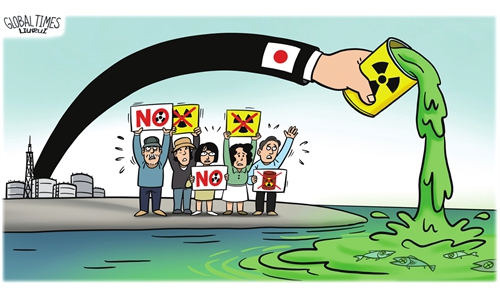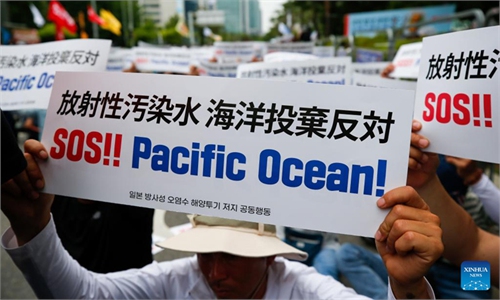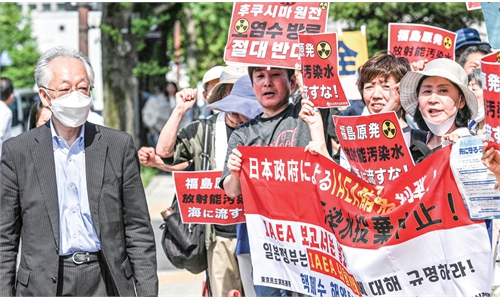
Japan's dangerous move. Illustration: Liu Rui/GT
The Japanese government is looking to start dumping nuclear-contaminated wastewater from the Fukushima nuclear power plant as early as August, reports show. It has triggered strong opposition from Japan's neighboring countries. But in the long run, the opposition will not be limited within the region for sure. As Japan is passing on the risks to the whole world, it will make itself, eventually, a global enemy.According to provisions in general international law and UNCLOS, Japan has an obligation to take all possible measures to prevent pollution of the environment, the obligation to notify and fully consult with states likely to be affected, the obligation to assess and monitor the environmental impact, the obligation to take precautions to minimize hazardous effects, the obligation to ensure transparency, and an obligation to engage in international cooperation.
However, Japan is attempting to evade responsibility and obligations by using various excuses and to blur the distinction between "treated nuclear-wastewater" and "nuclear-contaminated wastewater." Worse, Japan has decided to dump nuclear-contaminated wastewater into the ocean without fully studying and demonstrating various disposal options. Japan's action is extremely irresponsible as it puts the whole of humanity at risk.
The endorsement of the US and the West's inaction is a major cause of Japan's "courage" to ignore other countries' concerns. What's more, the International Atomic Energy Agency (IAEA) recently published a report, granting Japan stamp of approval for Fukushima wastewater dumping.
The report issued by the IAEA is not in line with common sense. First, the effectiveness of the Japanese nuclear-contaminated wastewater treatment facility is questionable. There are currently technical barriers in the treatment of certain radioactive nuclides. Moreover, the Japanese government plans to dump the nuclear-contaminated wastewater over a period of 30 years, thus concerns arise about facilities maintenance in the future.
Second, the long-term hazards of nuclear-contaminated wastewater are unpredictable. The Fukushima nuclear-contaminated wastewater contains long-lived radionuclides, which may form a bio-concentration effect, meaning the concentration of a chemical in an organism could become higher than its concentration in the air or water around the organism.
This report is inconsistent with research and analysis results of some authoritative marine research institutions and radioactive research institutions internationally. For example, a German marine research institution believes that the radioactive materials will spread to most of the Pacific Ocean and, in 10 years, to the waters across the world. Also, some reports say that certain radionuclides take longer to decay; carbon-14, for example, has a half-life of more than 5,000 years.
Against the backdrop, the IAEA has issued a report stating that Fukushima wastewater dumping is "consistent with relevant international safety standards." It can only prove the collusion between Japan and the IAEA. Although there is currently no evidence of Japan falsifying data, the incompleteness and lack of objectivity of the IAEA report are evident to the world.
Meanwhile, some Western countries have remained silent in this case. Their hesitation or acquiescence has boosted Japan's confidence in dumping nuclear-contaminated wastewater. However, ocean currents can potentially carry pollution to any part of the world. Moreover, this pollution may cause the ecologic damage that be never be repaired. From this perspective, Japan's culpability in Fukushima wastewater dumping could exceeds the damage it caused during World War II.
Once global waters are polluted, Japan will become a global enemy. At that time, international public opinion may shift. More countries, including those in the West, may criticize Japan. But that may be too late. The international community has an important consensus on environmental protection - the precautionary principle. The Rio Declaration (issued at the 1992 United Nations Conference on Environment and Development in Rio de Janeiro) states that "where there are threats of serious or irreversible damage, lack of full scientific certainty shall not be used as a reason for postponing cost-effective measures to prevent environmental degradation." Japan's current actions have seriously violated this principle.
Currently, the international community lacks an international enforcement mechanism to prevent Japan's dumping of nuclear-contaminated wastewater. Some observers suggest Japan should be brought to the International Court of Justice or the International Tribunal for the Law of the Sea. However, such international litigation requires the consensus of relevant countries or international organizations, and a firm political will. Moreover, this type of litigation is time-consuming, and faces numerous political and technical obstacles.
In light of this, China should continue to use diplomatic channels, based on relevant international laws, to urge Japan to halt its plan to dump nuclear-contaminated wastewater into the sea, together with the countries and international community most affected. At the same time, China should ban the import of nuclear-contaminated seafood and other products from Japan and other countries due to Japan's nuclear-contaminated wastewater. China could even impose sanctions on the Tokyo Electric Power Company Holdings.
China has consistently urged the Japanese side to take into account the legitimate concerns of the international community and its own people and to handle the dumping of nuclear-contaminated wastewater in a manner that complies with international obligations, international safety standards, and international best practices. This includes fully researching and demonstrating alternative disposal methods beyond dumping nuclear-contaminated wastewater into the sea in order to avoid transferring unpredictable risks to the international community.
The author is a Chinese maritime law expert at the Chinese Academy of Social Sciences. opinion@globaltimes.com.cn



